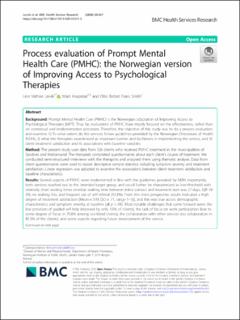| dc.description.abstract | Background: Prompt Mental Health Care (PMHC) is the Norwegian adaptation of Improving Access to Psychological Therapies (IAPT). Thus far, evaluations of PMHC have mostly focused on the effectiveness, rather than on contextual and implementation processes. Therefore, the objective of this study was to do a process evaluation and examine: 1) To what extent do the services follow guidelines provided by the Norwegian Directorate of Health (NDH), 2) what the therapists experienced as important barriers and facilitators in implementing the service, and 3) client treatment satisfaction and its associations with baseline variables.
Method: The present study uses data from 526 clients who received PMHC treatment in the municipalities of Sandnes and Kristiansand. The therapists completed questionnaires about each client’s course of treatment. We conducted semi-structured interviews with the therapists and analysed them using thematic analysis. Data from client questionnaires were used to report descriptive sample statistics including symptom severity and treatment satisfaction. Linear regression was adopted to examine the associations between client treatment satisfaction and baseline characteristics.
Results: Several aspects of PMHC were implemented in line with the guidelines provided by NDH. Importantly, both services reached out to the intended target group, and could further be characterized as low-threshold with relatively short waiting times (median waiting time between initial contact and treatment start was 27 days, IQR 18–39), no waiting lists, and frequent use of self-referral (33.3%). From the client perspective, results indicated a high degree of treatment satisfaction (Mean = 3.93 (SD = .71, range 1–5)), and this was true across demographic characteristics and symptom severity at baseline (all p > .05). Most notable challenges that came forward were; the low provision of guided self-help (received by only 1.0% of clients), the lack of focus on work participation (low to some degree of focus in 70.8% among sick-listed clients), the collaboration with other services (no collaboration in 85.3% of the clients), and some aspects regarding future development of the service.
Conclusion: Both sites managed to implement key aspects of PMHC in line with the guidelines, but further development of the program is warranted. Discussion of challenges and future recommendations are presented. | en_US |

